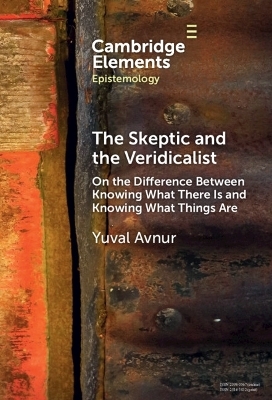
The Skeptic and the Veridicalist
On the Difference Between Knowing What There Is and Knowing What Things Are
Seiten
2024
Cambridge University Press (Verlag)
978-1-009-46229-7 (ISBN)
Cambridge University Press (Verlag)
978-1-009-46229-7 (ISBN)
This Element explores skepticism about the external world by considering an essential anti-skeptical strategy. The strategy is to posit a metaphysical view of external objects nullifying standard skeptical scenarios. Skepticism of objects reveals the nature of the problem and solution.
This Element explores the nature and formulation of skepticism about the external world by considering an important anti-skeptical strategy, 'veridicalism.' According to veridicalism, even if you are in a skeptical scenario, your beliefs about the existence of ordinary objects are still true. For example, even if you are in a global simulation, things such as tables exist as simulated objects. Therefore, your ignorance of whether you are in such a scenario does not negate your knowledge that there are tables. This strategy fails because it raises an equally troubling skepticism about what such objects are: is the table you now see a simulated object? That this is equally troubling suggests that the core skeptical problem is about what the causes of our experiences are, regardless of whether they count as ordinary objects like tables. This motivates a reconsideration of the standard formulation of the skeptical argument, and undermines some other anti-skeptical strategies as well.
This Element explores the nature and formulation of skepticism about the external world by considering an important anti-skeptical strategy, 'veridicalism.' According to veridicalism, even if you are in a skeptical scenario, your beliefs about the existence of ordinary objects are still true. For example, even if you are in a global simulation, things such as tables exist as simulated objects. Therefore, your ignorance of whether you are in such a scenario does not negate your knowledge that there are tables. This strategy fails because it raises an equally troubling skepticism about what such objects are: is the table you now see a simulated object? That this is equally troubling suggests that the core skeptical problem is about what the causes of our experiences are, regardless of whether they count as ordinary objects like tables. This motivates a reconsideration of the standard formulation of the skeptical argument, and undermines some other anti-skeptical strategies as well.
1. Introduction; 2. Veridicalism; 3. Problems for the veridicalist anti-skeptical strategy; 4. Objections and further implications; 5. General implications for skepticism and anti-skeptical strategies; References.
| Erscheinungsdatum | 09.01.2024 |
|---|---|
| Reihe/Serie | Elements in Epistemology |
| Zusatzinfo | Worked examples or Exercises |
| Verlagsort | Cambridge |
| Sprache | englisch |
| Themenwelt | Geisteswissenschaften ► Philosophie ► Erkenntnistheorie / Wissenschaftstheorie |
| Geisteswissenschaften ► Philosophie ► Metaphysik / Ontologie | |
| ISBN-10 | 1-009-46229-6 / 1009462296 |
| ISBN-13 | 978-1-009-46229-7 / 9781009462297 |
| Zustand | Neuware |
| Informationen gemäß Produktsicherheitsverordnung (GPSR) | |
| Haben Sie eine Frage zum Produkt? |
Mehr entdecken
aus dem Bereich
aus dem Bereich
die Grundlegung der modernen Philosophie
Buch | Softcover (2023)
C.H.Beck (Verlag)
CHF 25,20
Buch | Softcover (2023)
Reclam, Philipp (Verlag)
CHF 9,80

![Was heißt Denken?. Vorlesung Wintersemester 1951/52. [Was bedeutet das alles?] - Martin Heidegger](/media/113619842)
